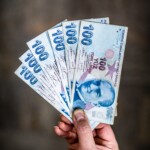Britain’s decision to sanction two Turkish entities may suggest that London and its Western allies are unsatisfied with Ankara’s efforts to prevent Turkish businesses from supplying the Russian military with vital military components.
UK Foreign Secretary James Cleverly last week announced “new sanctions on individuals and businesses outside Russia supporting Putin’s illegal invasion of Ukraine,” including two Turkish businesses accused of supplying microelectronics to Russia’s defense industry. The UK designations demonstrate Ankara’s role in helping Moscow evade Western sanctions and export controls targeting Russia’s war machine.
The two Turkish entities are Turkik Union and Azu International. London designated them for exporting microelectronics that are “essential for Russia’s military activity in Ukraine,” according to the UK press release.
One of those companies, Azu International, was previously sanctioned by the U.S. Treasury Department in April 2023 for supplying Russia with “foreign-origin electronics technology such as computer chips.” The previous December, a Reuters investigation revealed that a Turkish businessman founded Azu International in March 2022, shortly after Moscow’s full-scale invasion of Ukraine, with the apparent purpose of transshipping export-control products to Russia. Over the next seven months, the company supplied Russia with at least $20 million worth of components, including U.S.-made chips, Reuters found.
The UK government gave no further details regarding Turkik Union other than noting that it “is a Turkish exporter of computers and microelectronics and has supplied entities involved in the Russian defense sector.”
Following Russia’s invasion of Ukraine in February 2022, the United States and its allies expanded their sanctions and export controls against Russia. Among other things, the coalition imposed stringent restrictions on shipments of Western microelectronics, on which Moscow’s defense industry depends. However, Turkey quickly emerged as a key jurisdiction for Russian evasion.
Ankara has hedged its position within the Western alliance. On the one hand, Turkey has supplied combat drones, armored vehicles, and other materiel to the Ukrainian military. President Recep Tayyip Erdogan also helped broker a now-suspended deal allowing exports of Ukrainian grain and limited the movement of Russian warships through the Turkish straits.
On the other hand, Erdogan has consistently refused to participate in the international sanctions regime. Russia and Turkey maintain a close energy partnership and have expanded their trade and financial ties. Russian businesses flocked to Turkey following the invasion, as did yachts owned by Russian oligarchs. Turkish exports to Russia surged by over 60 percent last year as Russians looked to procure goods — including dual-use products — through Turkey.
Under U.S. pressure, the Turkish government has taken some initial steps to curtail Russian circumvention. In September 2022, three state-owned Turkish banks suspended their use of the “Mir” payment system, Moscow’s alternative to Visa and MasterCard. Last March, media reports indicated Ankara was cracking down on illicit transshipment of Western goods to Russia.
However, Britain’s decision to sanction these two Turkish entities may suggest that London and its Western allies are unsatisfied with Ankara’s efforts to prevent Turkish businesses from supplying the Russian military with vital military components.
Washington and its allies should continue to push Ankara to crack down on Russian evasion. The Western allies should also identify other Turkish entities that are supporting Russia and helping it continue its illegal war effort. If Ankara refuses to force these entities to cease their commercial ties with Russia, the West should sanction them.
This article was originally published by the Foundation for Defense of Democracies.
The views and opinions expressed above are the author’s and do not represent those of the Free Turkish Press.


